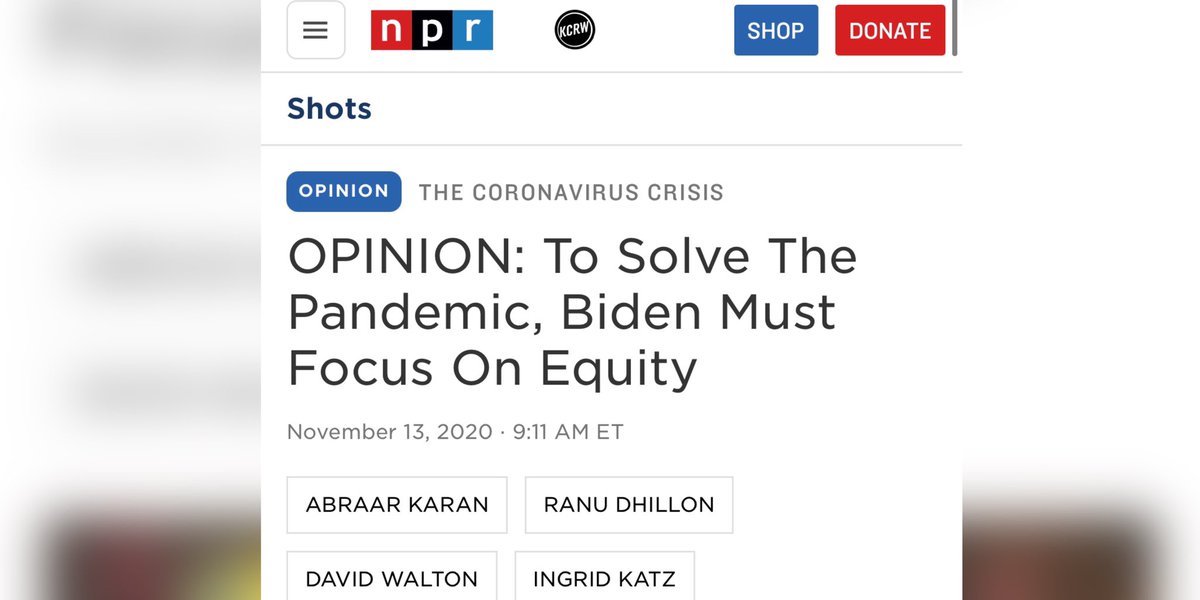
1/ The single most important lesson I learned working on a state #covid19 response for 7 months: there is nothing worse you can do in an epidemic than waste time
We had over 187,000 new cases yesterday
What the hell are we doing?
We had over 187,000 new cases yesterday
What the hell are we doing?
https://twitter.com/AbraarKaran/status/1257526025245855747
2/ We have an intervention that we know works, that is of immense benefit w/ little to no cost. Yet we are still leaving that up to choice in so many parts of this country.
Don't ask me to say #MaskUp again- we need a national mask mandate for indoor spaces, now.
Don't ask me to say #MaskUp again- we need a national mask mandate for indoor spaces, now.
3/ We have thousands of Americans (maybe more) who are thinking about flying around the country for the holidays.
This is a true catastrophe waiting to happen. This is an epidemic slingshot being stretched, & will fire off more cases than we can handle.
This is a true catastrophe waiting to happen. This is an epidemic slingshot being stretched, & will fire off more cases than we can handle.
4/ We know this, yet we are "advising" that people don't do it.
That's leadership?
That's recklessness. You will not find a single public health expert advising travel right now; we are consistently saying do not do it. Do not endanger your families
Viral spread is too high
That's leadership?
That's recklessness. You will not find a single public health expert advising travel right now; we are consistently saying do not do it. Do not endanger your families
Viral spread is too high
5/ Our public messaging on this needs to be much more direct
We might all be tired; most of us are. I am.
But the reality is what it is
We are in the situation we are in
We need to step up now
We cannot propagate this further; it will break down our healthcare system
We might all be tired; most of us are. I am.
But the reality is what it is
We are in the situation we are in
We need to step up now
We cannot propagate this further; it will break down our healthcare system
6/ Not only should you be "hunkering down" as @zeynep said; you should see it as a public service to convince friends, neighbors and others who trust you to do the same.
This has always been a community response. It will take all of us working *together*
theatlantic.com/health/archive…
This has always been a community response. It will take all of us working *together*
theatlantic.com/health/archive…
7/ One of the most important things I could do this week was to call some of my own family members in other parts of the country & reinforce this to them.
They canceled their trip.
If each of us can do this, we can avoid *a lot* of transmission. Don't underestimate it.
They canceled their trip.
If each of us can do this, we can avoid *a lot* of transmission. Don't underestimate it.
8/ The epidemic seems largely out of control right now; except that it really still is in our hands.
Every day is a day we can stop a new transmission chain from starting; a new day we can avert another super spreading disaster.
We have to believe that our actions *matter*
Every day is a day we can stop a new transmission chain from starting; a new day we can avert another super spreading disaster.
We have to believe that our actions *matter*
cc thread @mccabe_caitlin @edyong209 @apoorva_nyc @kakape @thehowie @RanuDhillon @celinegounder @syramadad @choo_ek @MoNscience @AliNouriPhD @angie_rasmussen @KatherineJWu @AmyMacKinnon @acsifferlin @cglennvino @KateTripp @francesmargaret @chrissyfarr @cshea4 @Laurie_Garrett
cc thread @jabarocas @rkwadhera @nataliexdean @EpiEllie @T_Inglesby @ASlavitt @j_g_allen @Atul_Gawande @CarlosdelRio7 @balajis @carlzimmer @powellnyt @B_resnick
cc @DrTomFrieden @llborio @jljcolorado @neel_shah @muhammadpate @kj_seung @ReganHMarsh @Craig_A_Spencer
• • •
Missing some Tweet in this thread? You can try to
force a refresh




